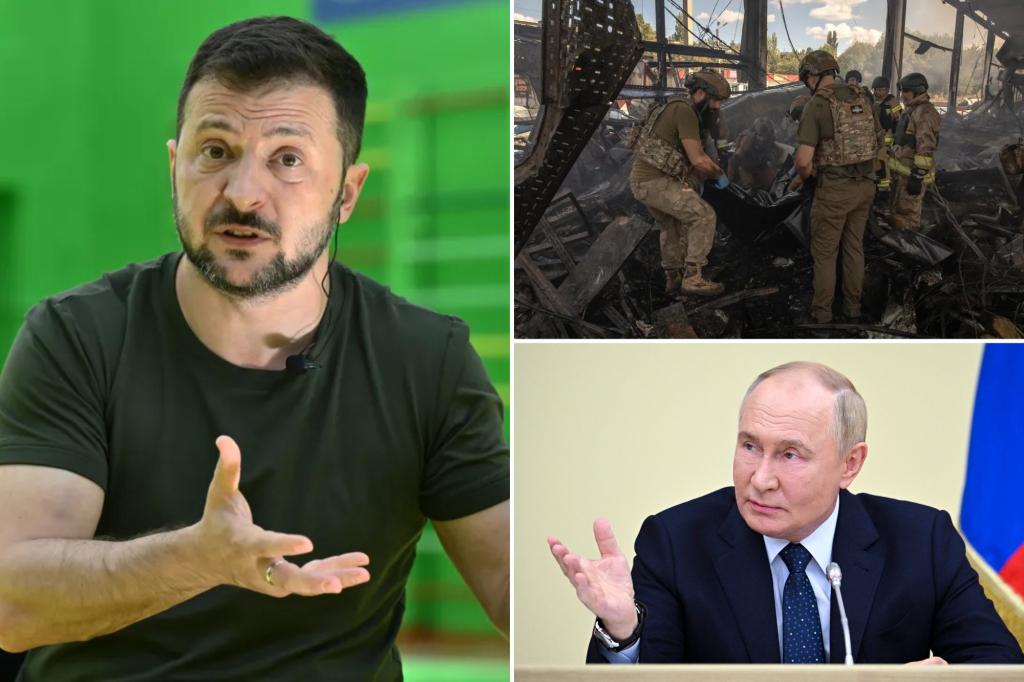Ukraine has launched a major military operation to stab, grab and hold territory inside of Russia.
The move is historic, making the first time since World War II that the armed forces of a sovereign country have invaded and occupied Russian territory.
Volodymyr Zelensky’s gambit is high-risk and high-reward: So long as Ukrainian forces hold Russian lands, Kyiv gains a powerful bargaining chip in any talks over the war’s endgame.
By blitzing troops into Russia’s southern underbelly with Ukraine, Zelensky has also dealt a major political blow to Vladimir Putin.
Ukraine’s military strategy to hold part of the Kursk Region steals a page from the legendary strategist Sun Tzu: “Strike where the enemy is most vulnerable.”
With the bulk of Putin’s assets fighting in Ukraine’s east, Zelensky has launched some of his own forces — apparently over 1,000 troops at this point — into the poorly defended border zone to its north.
The tables are now turned: The land war for Ukraine has come to Russia, and Putin’s citizens are evacuating their homes by the thousands.
The Ukrainian government is always silent during high-profile operations such as this one, but Zelensky adviser Mykhailo Podolyak hinted that Ukraine was prepared to hold onto its gains: “We have to push them back in some areas if we are going to make those areas safe for us,” he said. “And we are creating a buffer zone.”
Zelensky himself has said only: “Russia brought the war to our land, and it should feel what it has done.”
Yet this strategy also gains new political leverage.
Current polls indicate that a majority of Ukrainians are opposed to trading their own land for peace with Putin, fiercely rejecting any effort to end the war by surrendering their own territory.
Would they accept a trade of Russian land for peace? It is an obvious factor that Zelensky must consider, now that his troops control some Russian territory and the US presidential election looms on the horizon.
On the campaign trail, Donald Trump has repeatedly said that he could resolve the war between Russia and Ukraine “in 24 hours.”
Certainly, the prospects for a negotiated end to the fighting are greater if Zelensky has something to trade that a majority of his people — and Putin — would accept: Russian territory.
Astonishingly, the surprise Ukrainian blitz caught the Biden-Harris administration off guard.
The State Department indicated that the United States did not have advanced notice of Ukraine’s incursion; the news put National Security spokesman John Kirby on the back foot.
He admitted, “We are, as you would expect we would be, reaching out to our Ukrainian counterparts to get a little bit better understanding” into what’s happening.
For his part, Putin projected calm. In a televised statement, he framed the Ukrainian advances into Russia as a “large-scale provocation” — but not as an invasion.
That choice of words was important: Russia’s military doctrine allows for the use of tactical nuclear weapons if a conventional attack by a foreign power threatens the existence of the Russian state.
By treating Ukraine’s blitz as a nuisance and not a fight for national survival, Putin signaled that nuclear escalation is not on the table.
However, the “provocation” will force Russia to reinforce its full border with more troops to prevent future raids by Ukraine.
The political blow to Putin is significant: This represents the first time since 1941 that a foreign country has occupied part of Russia.
It also recalls humiliating foreign military occupations of Russia during its Revolution and Civil War nearly a hundred years ago. Even now, these events loom large in the Russian political memory.
Putin’s rule is premised on his promise to keep Russians safe. For the second time in six months (after the March terror attack on a Moscow concert), he has manifestly failed to do so, for at least some of his citizens.
For now, Ukraine’s president is keeping his cards close to his vest. He has raised the stakes.
What he does next could alter the outcome of his war for Ukraine’s survival.
Peter Doran is adjunct senior fellow at the Foundation for Defense of Democracies.
